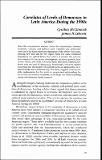| dc.description.abstract |
Does the conventional wisdom about the relationships between economic, cultural, and political party variables and democracy stand up in the Latin American experience of the 1990s? This study, utilizing new data sets for the region, finds that some traditional hypotheses are upheld better than others. It sustains the conventional wisdom that economic development, economic growth, democratic values, and (with a two-year lead) education correlate positively with the level of democracy. Surprisingly, however, neither social trust nor the number of political parties is significantly correlated with the level of democracy. The study suggests various possible explanations for the weak or nonexistent relationships for social trust and number of parties, in the hope that these surprising results will stimulate further research. |

